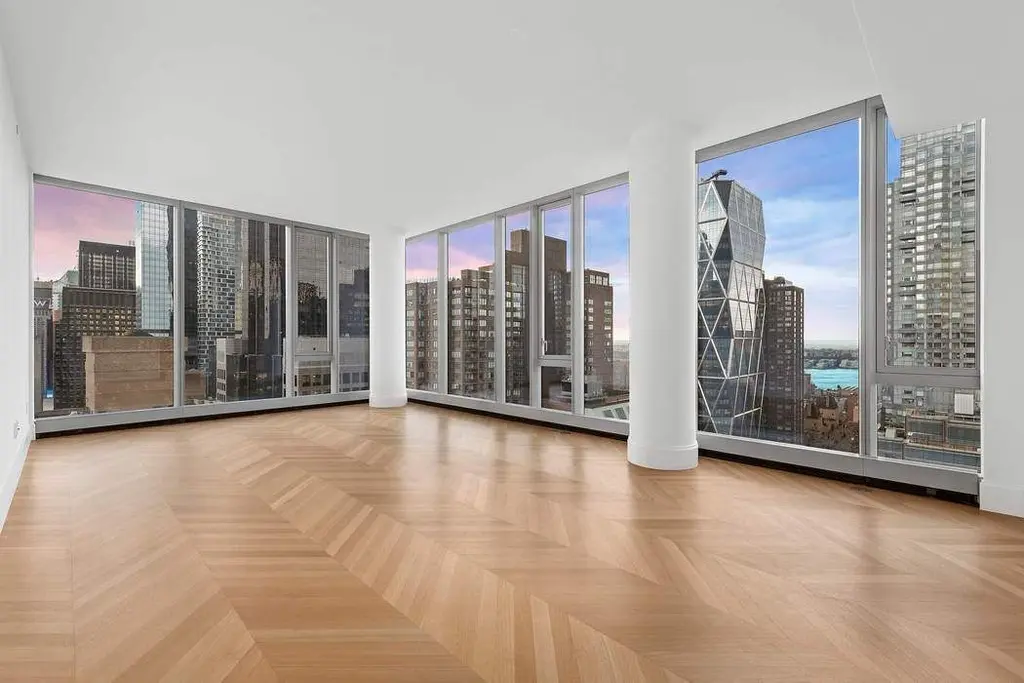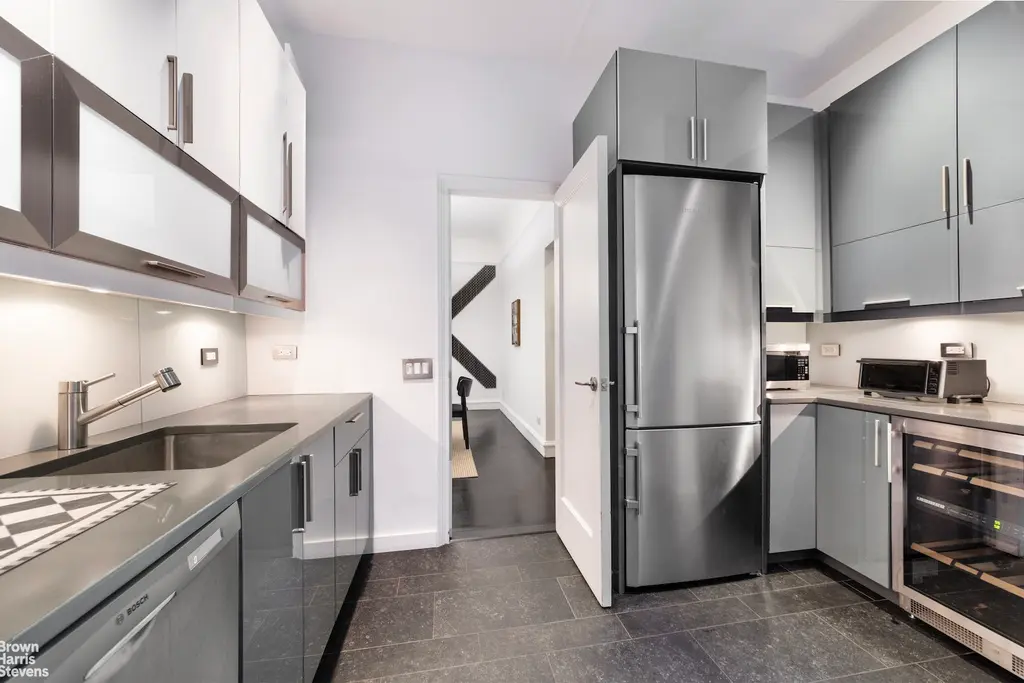
Most Popular Buildings on CityRealty in January 2024
In this article:
Billionaires' Row
84 floors | 60 condo units | Completed in 2021
SHoP Architects | JDS Development Group and Property Markets Group
2023 PPSF: $3,989 (7 sales)
10 public availabilities from $8.495M - $54.6M
84 floors | 60 condo units | Completed in 2021
SHoP Architects | JDS Development Group and Property Markets Group
2023 PPSF: $3,989 (7 sales)
10 public availabilities from $8.495M - $54.6M
From the meticulously restored Steinway Hall at its base to the world's skinniest tower ascending next door, every facet of 111 West 57th Street demands attention. The apartments in Steinway Hall boast rich prewar-inspired design details, while the tower is home to full-floor residences featuring soaring ceilings and marvelous panoramic city views. Residents of both components enjoy access to an incredible amenity suite.

111 West 57th Street, #56 (Corcoran Group)

217 West 57th Street | Billionaires' Row
98 floors | 179 condo units | Completed in 2021
Adrian Smith + Gordon Gill Architecture | Extell Development
2023 PPSF: $4,331 (21 sales)
11 public availabilities from $6.5M - $195M
98 floors | 179 condo units | Completed in 2021
Adrian Smith + Gordon Gill Architecture | Extell Development
2023 PPSF: $4,331 (21 sales)
11 public availabilities from $6.5M - $195M
Central Park Tower, #35F
$6,895,000 (-11%)
Midtown West | Condominium | 2 Bedrooms, 3 Baths | 2,114 ft2

Central Park Tower, #35F (Sothebys International Realty)

#3. The Alwyn Court
Would you like to tour any of these properties?
Just complete the info below.
Or call us at (212) 755-5544
180 West 58th Street | Midtown West
12 floors | 74 co-op units | Completed in 1910
Harde & Short | Walter Russell
2023 PPSF: $1,086 (2sales)
2 public availabilities from $1.05M - $2.295M
12 floors | 74 co-op units | Completed in 1910
Harde & Short | Walter Russell
2023 PPSF: $1,086 (2sales)
2 public availabilities from $1.05M - $2.295M
Constructed in 1908 and designed in the elegant French Renaissance style by the architectural firm of Harde & Short, Alwyn Court welcomed its first residents in 1910 and the terra cotta-clad structure was recognized as "one of the finest buildings of its type in New York City" upon receiving New York City Landmark designation in 1966.
The doorman building is renowned for its white-glove service and is pet-friendly. Amenities include a bike room, central laundry room, and a stunning interior courtyard atrium. The building also permits pied-à-terres. It is very close to Carnegie Hall, Central Park, Broadway shows, and the Shops at Columbus Circle.
The doorman building is renowned for its white-glove service and is pet-friendly. Amenities include a bike room, central laundry room, and a stunning interior courtyard atrium. The building also permits pied-à-terres. It is very close to Carnegie Hall, Central Park, Broadway shows, and the Shops at Columbus Circle.

The Alwyn Court, #11A (Brown Harris Stevens Residential Sales LLC)

#2. The Dakota
1 West 72nd Street | Central Park West
10 floors | 103 co-op units | Completed in 1884
Henry James Hardenbergh | Edward Cabot Clark
2023 PPSF: $1,875 (2 sales)
No Availabilities
10 floors | 103 co-op units | Completed in 1884
Henry James Hardenbergh | Edward Cabot Clark
2023 PPSF: $1,875 (2 sales)
No Availabilities
The Dakota at 1 West 72nd Street is renowned as one of the most iconic apartment buildings in the world. Recognized for its spacious residences, prime Central Park location, and rich history, it has been a choice residence for celebrities and countless notable figures. Designed by Henry J. Hardenbergh and completed in 1884, the Dakota features an unmistakable façade with ornate details and intricate ironwork. Residents enjoy homes ranging from 3 to 10 rooms, many with fireplaces. The building offers unparalleled Central Park access, a central courtyard, a new fitness center, top-tier privacy, security, and concierge service, and a full-time doorman welcoming owners and guests.
#1. Trump Tower
721 Fifth Avenue | Midtown West
58 floors | 238 condo units | Completed in 1983
Hayden Connell Swanke | Trump Organization
2023 PPSF: $1,564 (13 sales)
9 public availabilities from $1.9M - $10.5M
58 floors | 238 condo units | Completed in 1983
Hayden Connell Swanke | Trump Organization
2023 PPSF: $1,564 (13 sales)
9 public availabilities from $1.9M - $10.5M
Trump Tower, located at 721 Fifth Avenue in Midtown, is a distinctive glass tower developed by former U.S. President Donald Trump. Rising between East 56th and 57th streets, the 58-story building features residential condominiums on its highest 38 floors, including nine duplex and triplex penthouses. Most units have undergone renovations since delivery. Homes offer marble bathrooms, Jacuzzi bathtubs, wood and stone floors, custom kitchen cabinets, high-end appliances, walk-in closets, and in-unit washer and dryers. Many condos provide panoramic views of the New York City skyline and Central Park.
Amenities at Trump Tower include a full-time doorman, valet services, a fitness room, maid service, and a common storage room. The building's prime location places it very close to luxury retailers such as Bergdorf Goodman and Tiffany & Co., as well as renowned restaurants. Central Park and the Plaza Hotel are within two blocks, and the area is well-connected to public transportation.
Amenities at Trump Tower include a full-time doorman, valet services, a fitness room, maid service, and a common storage room. The building's prime location places it very close to luxury retailers such as Bergdorf Goodman and Tiffany & Co., as well as renowned restaurants. Central Park and the Plaza Hotel are within two blocks, and the area is well-connected to public transportation.

Trump Tower, #4849D (Douglas Elliman Real Estate)


Would you like to tour any of these properties?
Just complete the info below.
Or call us at (212) 755-5544
Would you like to tour any of these properties?

Contributing Writer
Cait Etherington
Cait Etherington has over twenty years of experience working as a journalist and communications consultant. Her articles and reviews have been published in newspapers and magazines across the United States and internationally. An experienced financial writer, Cait is committed to exposing the human side of stories about contemporary business, banking and workplace relations. She also enjoys writing about trends, lifestyles and real estate in New York City where she lives with her family in a cozy apartment on the twentieth floor of a Manhattan high rise.






 6sqft delivers the latest on real estate, architecture, and design, straight from New York City.
6sqft delivers the latest on real estate, architecture, and design, straight from New York City.
